Management and Operations Report: Leadership, Theories, and Skills
VerifiedAdded on 2023/02/02
|18
|1202
|93
Report
AI Summary
This report delves into the crucial aspects of management and operations, providing a detailed exploration of management theories, including classical, behavioral, and contingency theories. It contrasts the roles of leaders and managers, highlighting their distinct approaches and responsibilities within an organization. The report examines various leadership styles such as transformational, transactional, and action-centered leadership, emphasizing the importance of both hard and soft management skills for effective workplace performance. The conclusion underscores the significance of both leadership and management in achieving organizational objectives, supported by relevant references for further study. This report is a valuable resource for understanding the foundational principles of successful management and leadership.
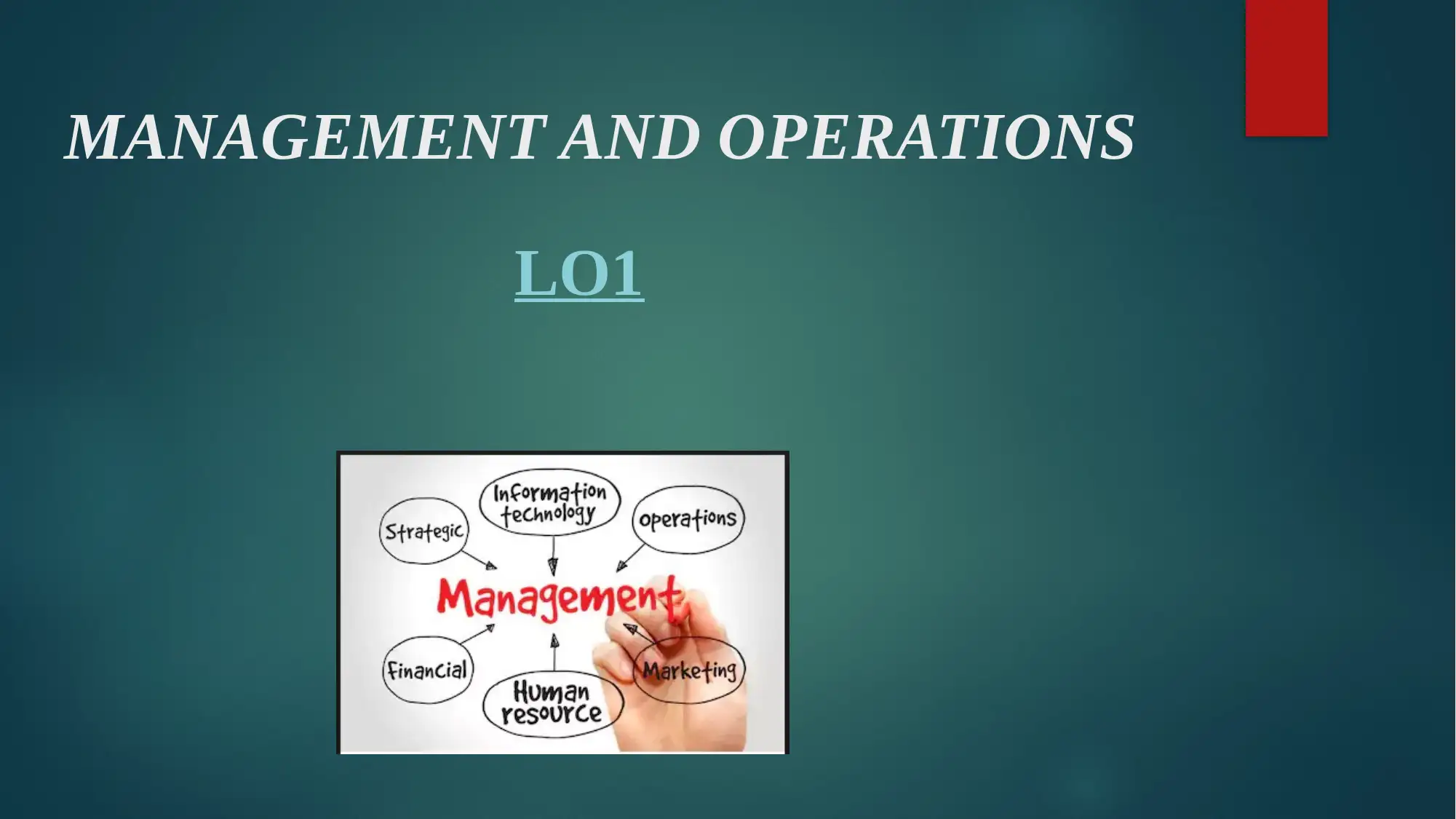
MANAGEMENT AND OPERATIONS
LO1
LO1
Paraphrase This Document
Need a fresh take? Get an instant paraphrase of this document with our AI Paraphraser
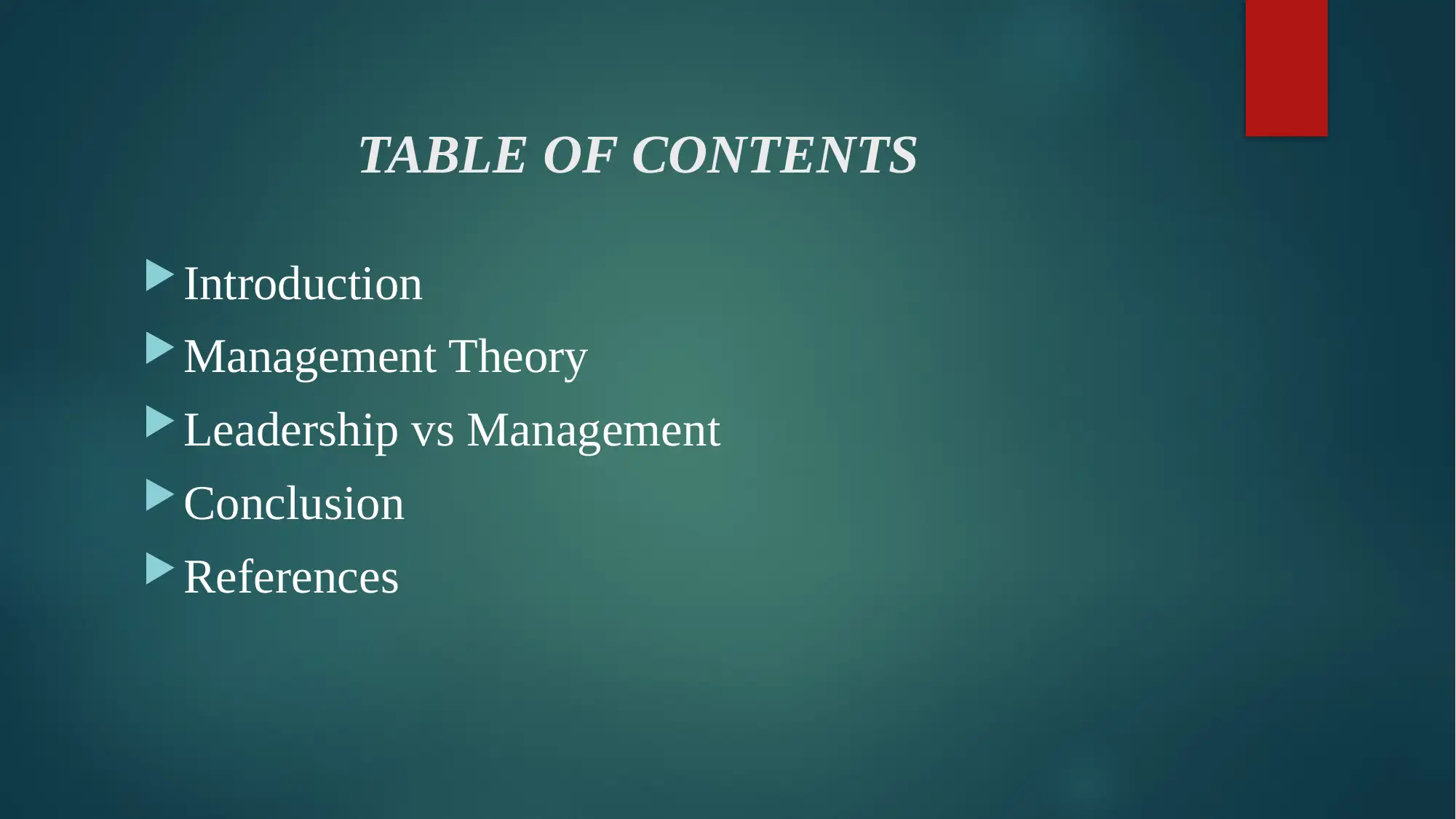
TABLE OF CONTENTS
Introduction
Management Theory
Leadership vs Management
Conclusion
References
Introduction
Management Theory
Leadership vs Management
Conclusion
References
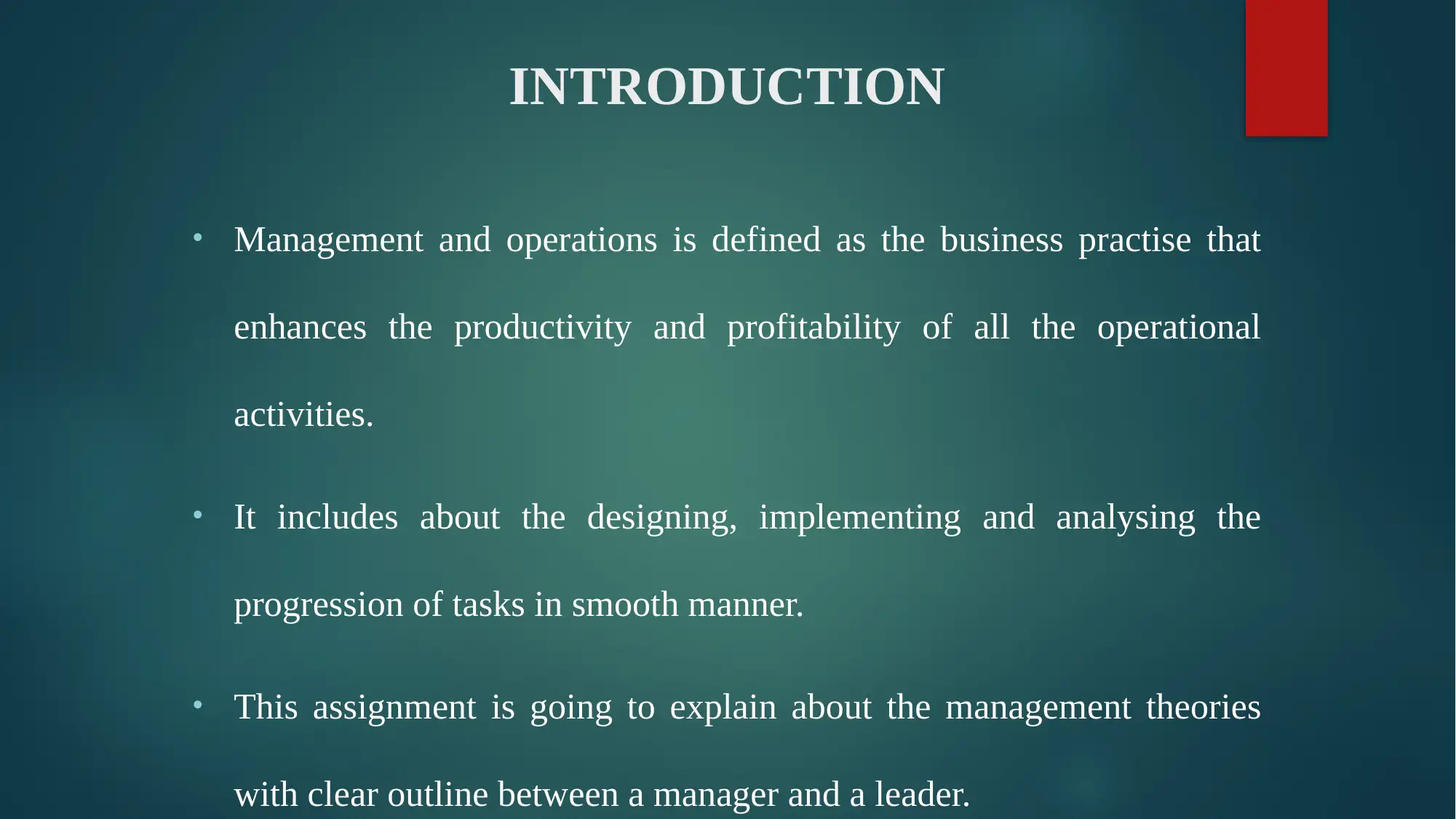
INTRODUCTION
• Management and operations is defined as the business practise that
enhances the productivity and profitability of all the operational
activities.
• It includes about the designing, implementing and analysing the
progression of tasks in smooth manner.
• This assignment is going to explain about the management theories
with clear outline between a manager and a leader.
• Management and operations is defined as the business practise that
enhances the productivity and profitability of all the operational
activities.
• It includes about the designing, implementing and analysing the
progression of tasks in smooth manner.
• This assignment is going to explain about the management theories
with clear outline between a manager and a leader.
⊘ This is a preview!⊘
Do you want full access?
Subscribe today to unlock all pages.

Trusted by 1+ million students worldwide
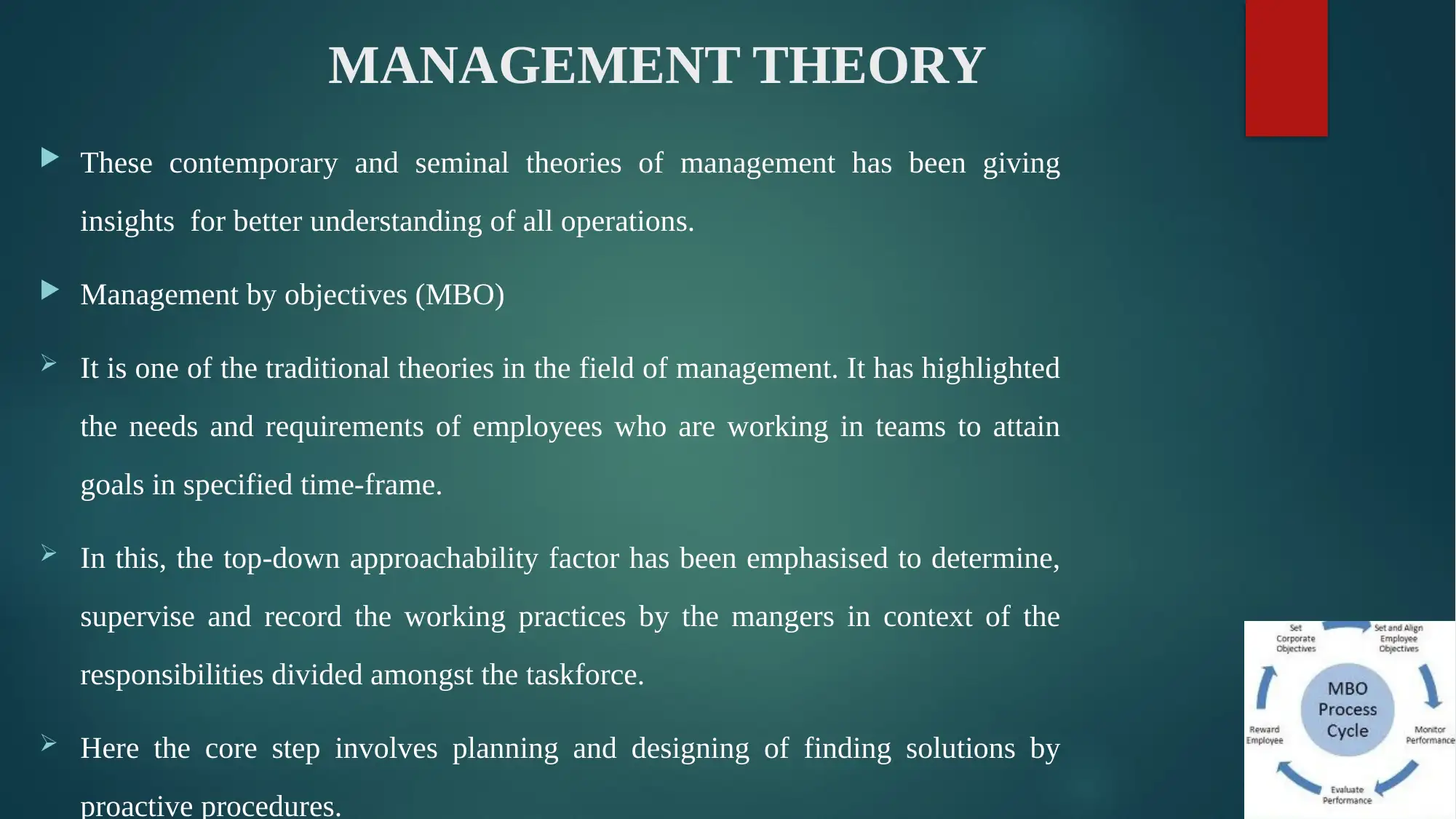
MANAGEMENT THEORY
These contemporary and seminal theories of management has been giving
insights for better understanding of all operations.
Management by objectives (MBO)
It is one of the traditional theories in the field of management. It has highlighted
the needs and requirements of employees who are working in teams to attain
goals in specified time-frame.
In this, the top-down approachability factor has been emphasised to determine,
supervise and record the working practices by the mangers in context of the
responsibilities divided amongst the taskforce.
Here the core step involves planning and designing of finding solutions by
proactive procedures.
These contemporary and seminal theories of management has been giving
insights for better understanding of all operations.
Management by objectives (MBO)
It is one of the traditional theories in the field of management. It has highlighted
the needs and requirements of employees who are working in teams to attain
goals in specified time-frame.
In this, the top-down approachability factor has been emphasised to determine,
supervise and record the working practices by the mangers in context of the
responsibilities divided amongst the taskforce.
Here the core step involves planning and designing of finding solutions by
proactive procedures.
Paraphrase This Document
Need a fresh take? Get an instant paraphrase of this document with our AI Paraphraser
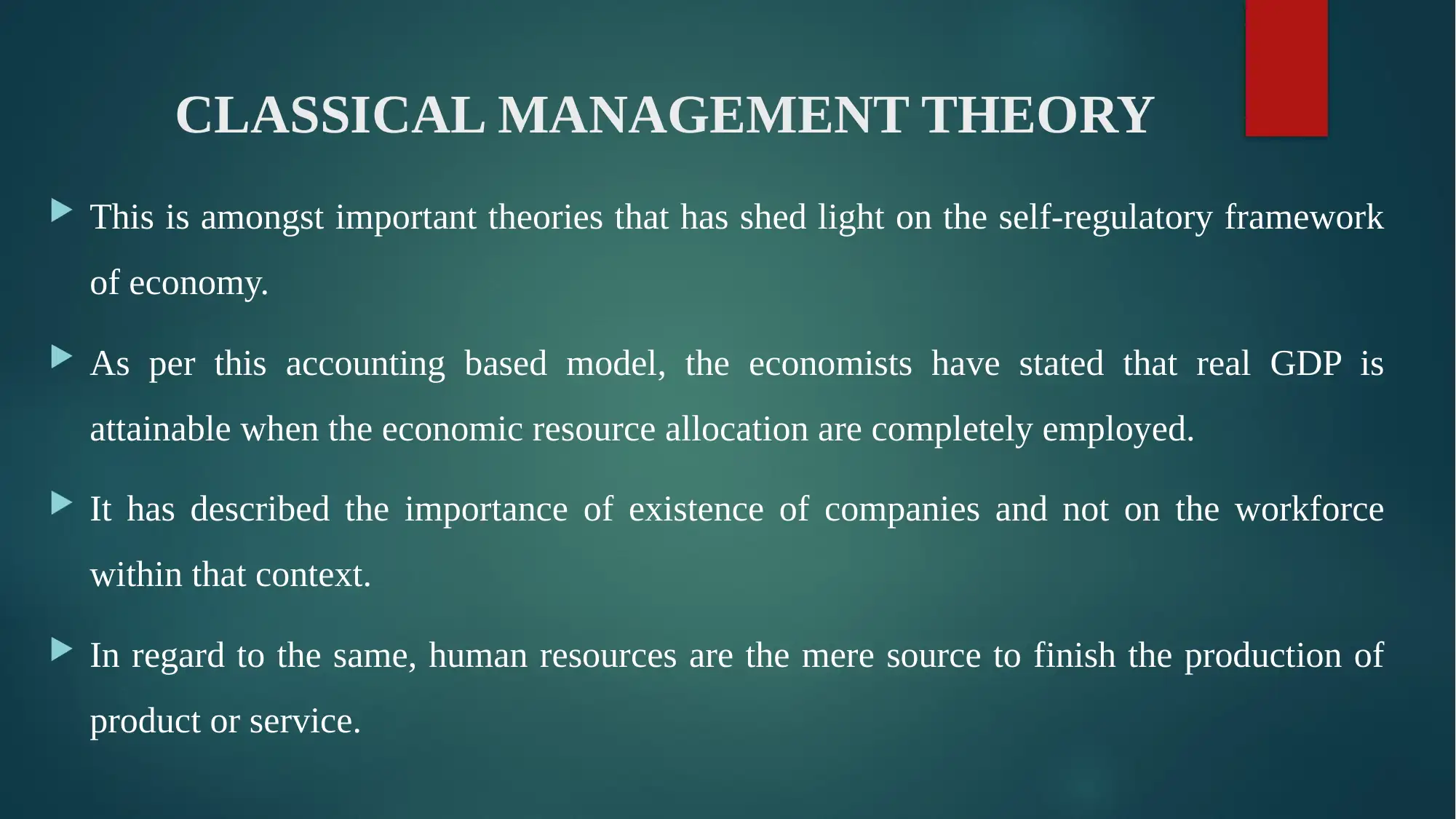
CLASSICAL MANAGEMENT THEORY
This is amongst important theories that has shed light on the self-regulatory framework
of economy.
As per this accounting based model, the economists have stated that real GDP is
attainable when the economic resource allocation are completely employed.
It has described the importance of existence of companies and not on the workforce
within that context.
In regard to the same, human resources are the mere source to finish the production of
product or service.
This is amongst important theories that has shed light on the self-regulatory framework
of economy.
As per this accounting based model, the economists have stated that real GDP is
attainable when the economic resource allocation are completely employed.
It has described the importance of existence of companies and not on the workforce
within that context.
In regard to the same, human resources are the mere source to finish the production of
product or service.
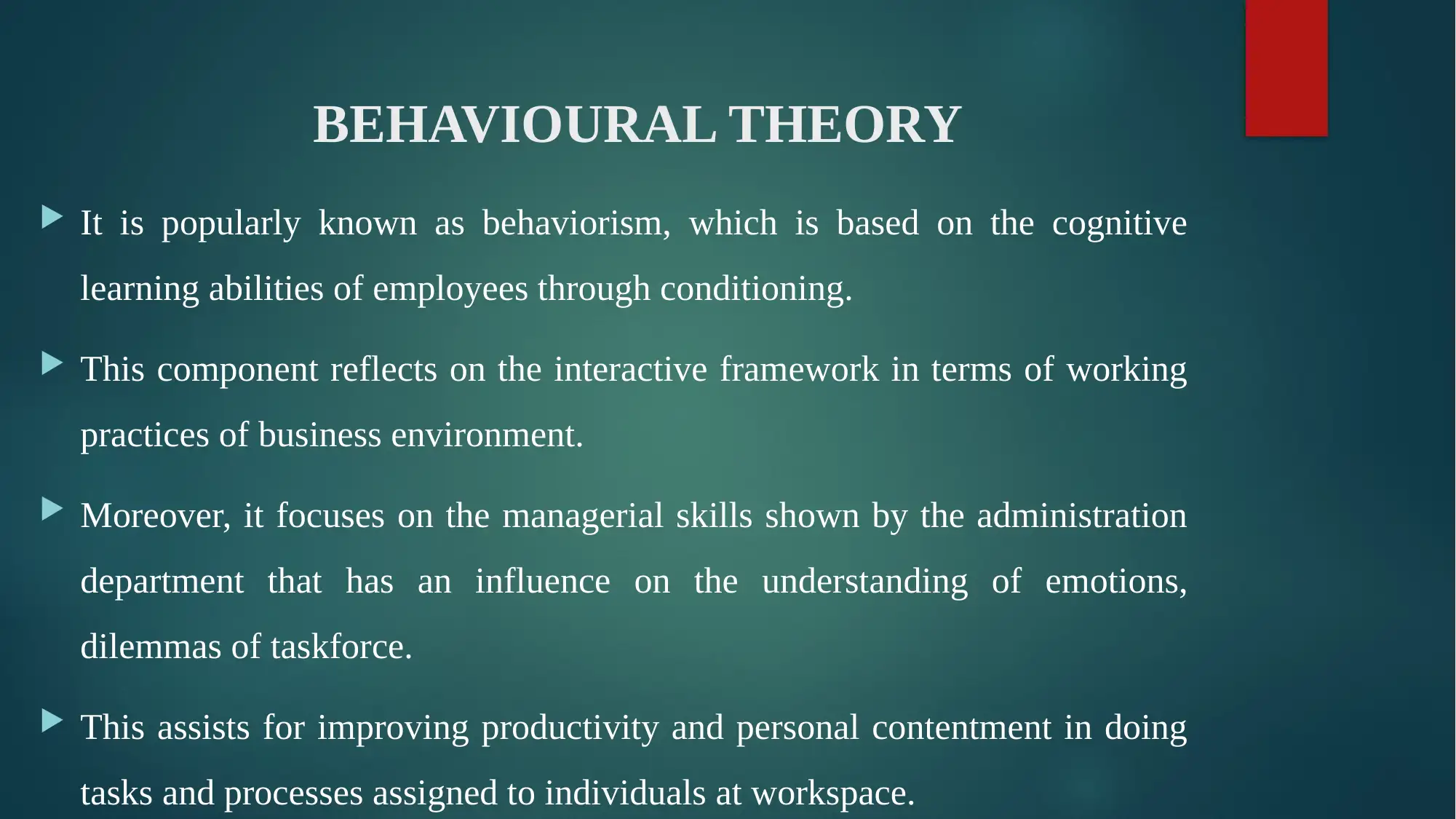
BEHAVIOURAL THEORY
It is popularly known as behaviorism, which is based on the cognitive
learning abilities of employees through conditioning.
This component reflects on the interactive framework in terms of working
practices of business environment.
Moreover, it focuses on the managerial skills shown by the administration
department that has an influence on the understanding of emotions,
dilemmas of taskforce.
This assists for improving productivity and personal contentment in doing
tasks and processes assigned to individuals at workspace.
It is popularly known as behaviorism, which is based on the cognitive
learning abilities of employees through conditioning.
This component reflects on the interactive framework in terms of working
practices of business environment.
Moreover, it focuses on the managerial skills shown by the administration
department that has an influence on the understanding of emotions,
dilemmas of taskforce.
This assists for improving productivity and personal contentment in doing
tasks and processes assigned to individuals at workspace.
⊘ This is a preview!⊘
Do you want full access?
Subscribe today to unlock all pages.

Trusted by 1+ million students worldwide
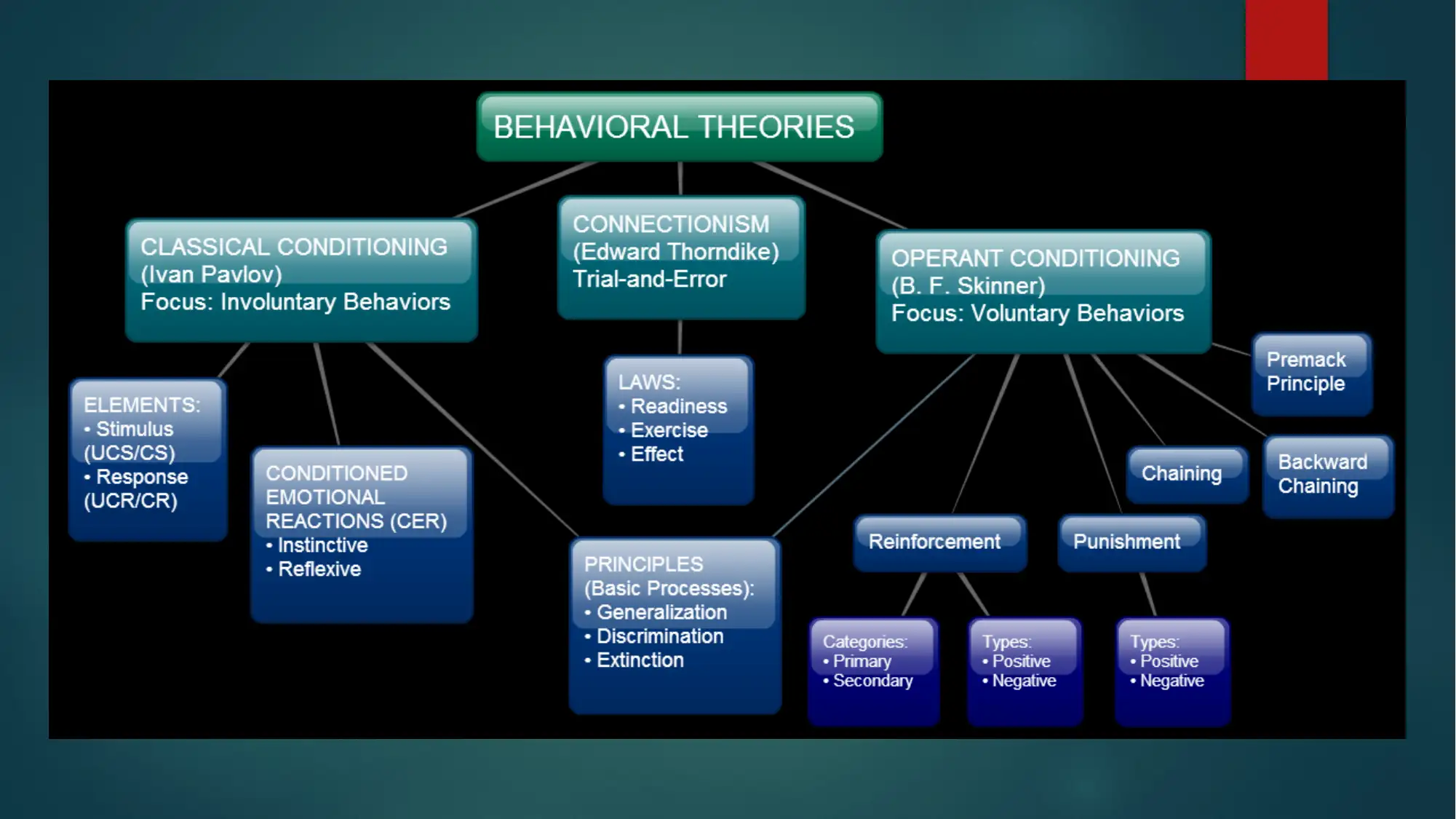
Paraphrase This Document
Need a fresh take? Get an instant paraphrase of this document with our AI Paraphraser
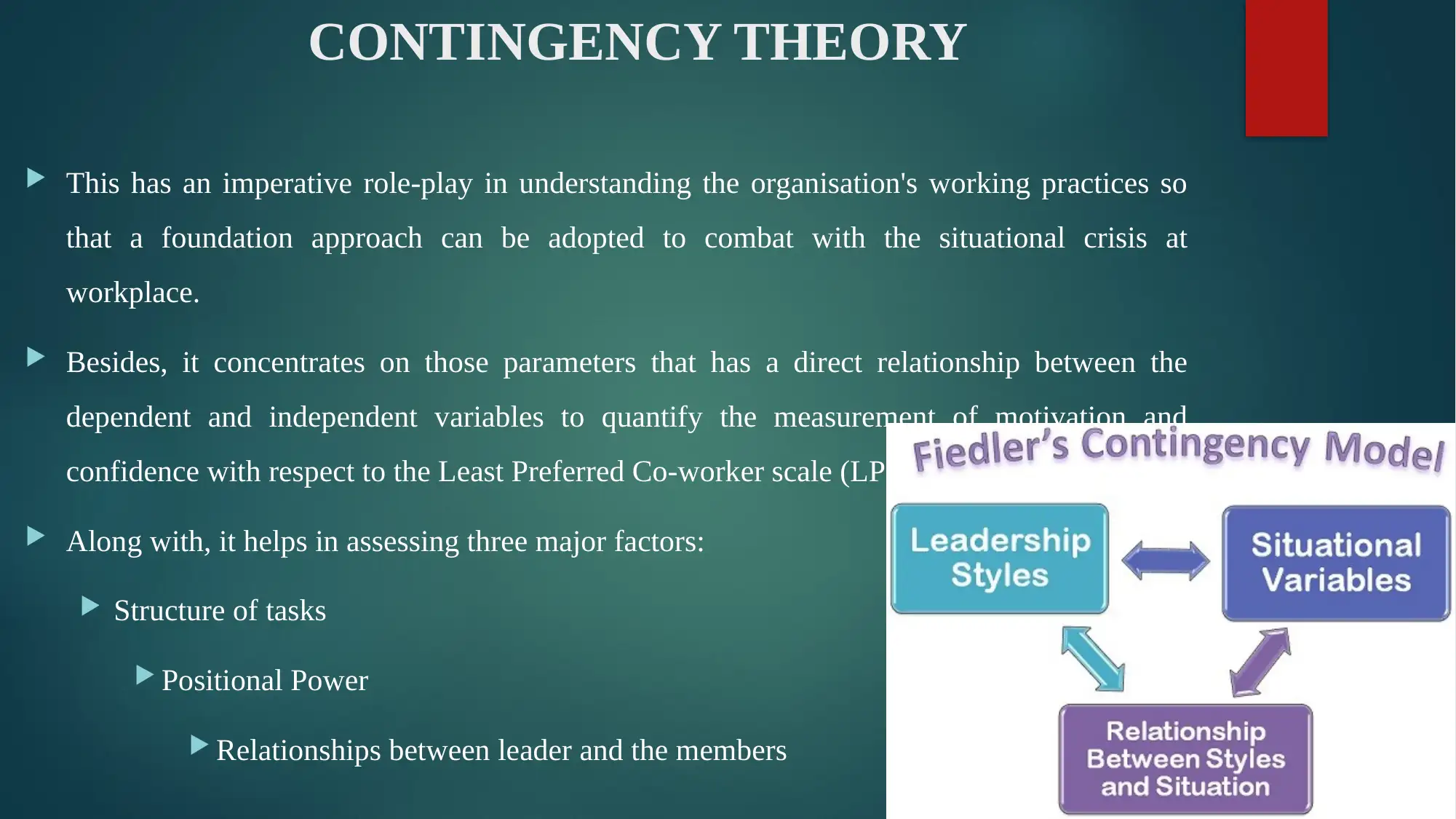
CONTINGENCY THEORY
This has an imperative role-play in understanding the organisation's working practices so
that a foundation approach can be adopted to combat with the situational crisis at
workplace.
Besides, it concentrates on those parameters that has a direct relationship between the
dependent and independent variables to quantify the measurement of motivation and
confidence with respect to the Least Preferred Co-worker scale (LPC).
Along with, it helps in assessing three major factors:
Structure of tasks
Positional Power
Relationships between leader and the members
This has an imperative role-play in understanding the organisation's working practices so
that a foundation approach can be adopted to combat with the situational crisis at
workplace.
Besides, it concentrates on those parameters that has a direct relationship between the
dependent and independent variables to quantify the measurement of motivation and
confidence with respect to the Least Preferred Co-worker scale (LPC).
Along with, it helps in assessing three major factors:
Structure of tasks
Positional Power
Relationships between leader and the members
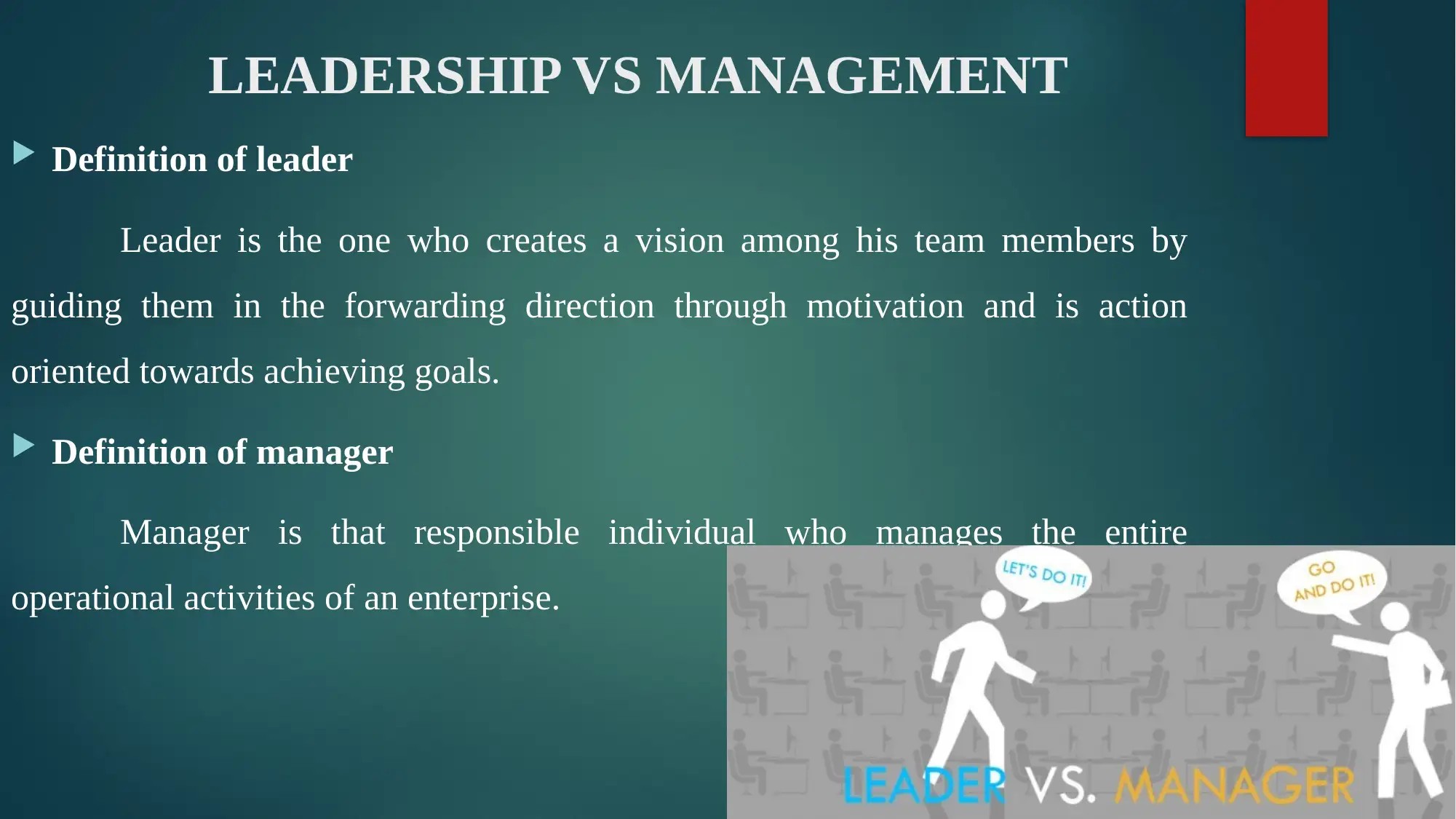
LEADERSHIP VS MANAGEMENT
Definition of leader
Leader is the one who creates a vision among his team members by
guiding them in the forwarding direction through motivation and is action
oriented towards achieving goals.
Definition of manager
Manager is that responsible individual who manages the entire
operational activities of an enterprise.
Definition of leader
Leader is the one who creates a vision among his team members by
guiding them in the forwarding direction through motivation and is action
oriented towards achieving goals.
Definition of manager
Manager is that responsible individual who manages the entire
operational activities of an enterprise.
⊘ This is a preview!⊘
Do you want full access?
Subscribe today to unlock all pages.

Trusted by 1+ million students worldwide
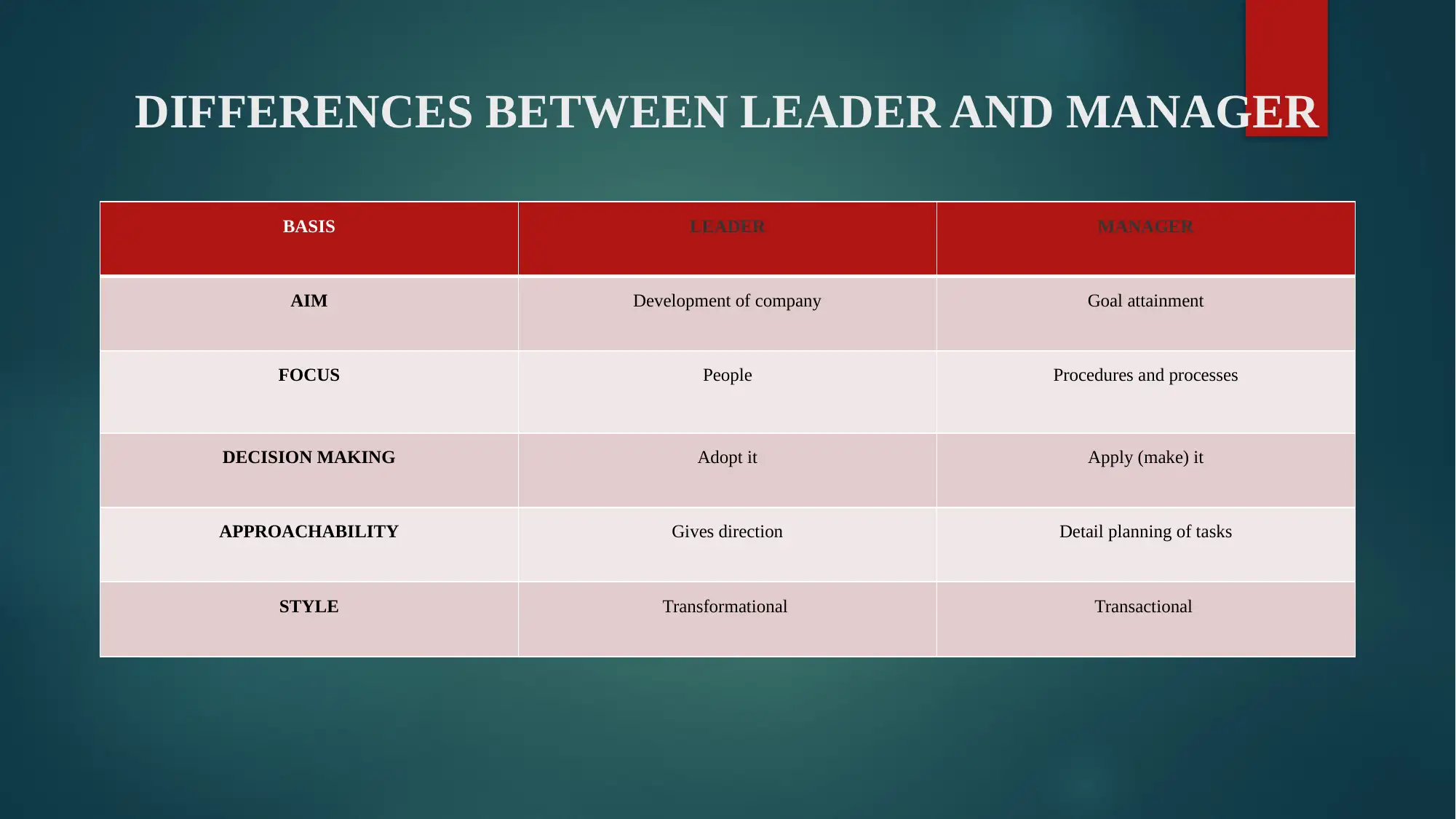
DIFFERENCES BETWEEN LEADER AND MANAGER
BASIS LEADER MANAGER
AIM Development of company Goal attainment
FOCUS People Procedures and processes
DECISION MAKING Adopt it Apply (make) it
APPROACHABILITY Gives direction Detail planning of tasks
STYLE Transformational Transactional
BASIS LEADER MANAGER
AIM Development of company Goal attainment
FOCUS People Procedures and processes
DECISION MAKING Adopt it Apply (make) it
APPROACHABILITY Gives direction Detail planning of tasks
STYLE Transformational Transactional
Paraphrase This Document
Need a fresh take? Get an instant paraphrase of this document with our AI Paraphraser
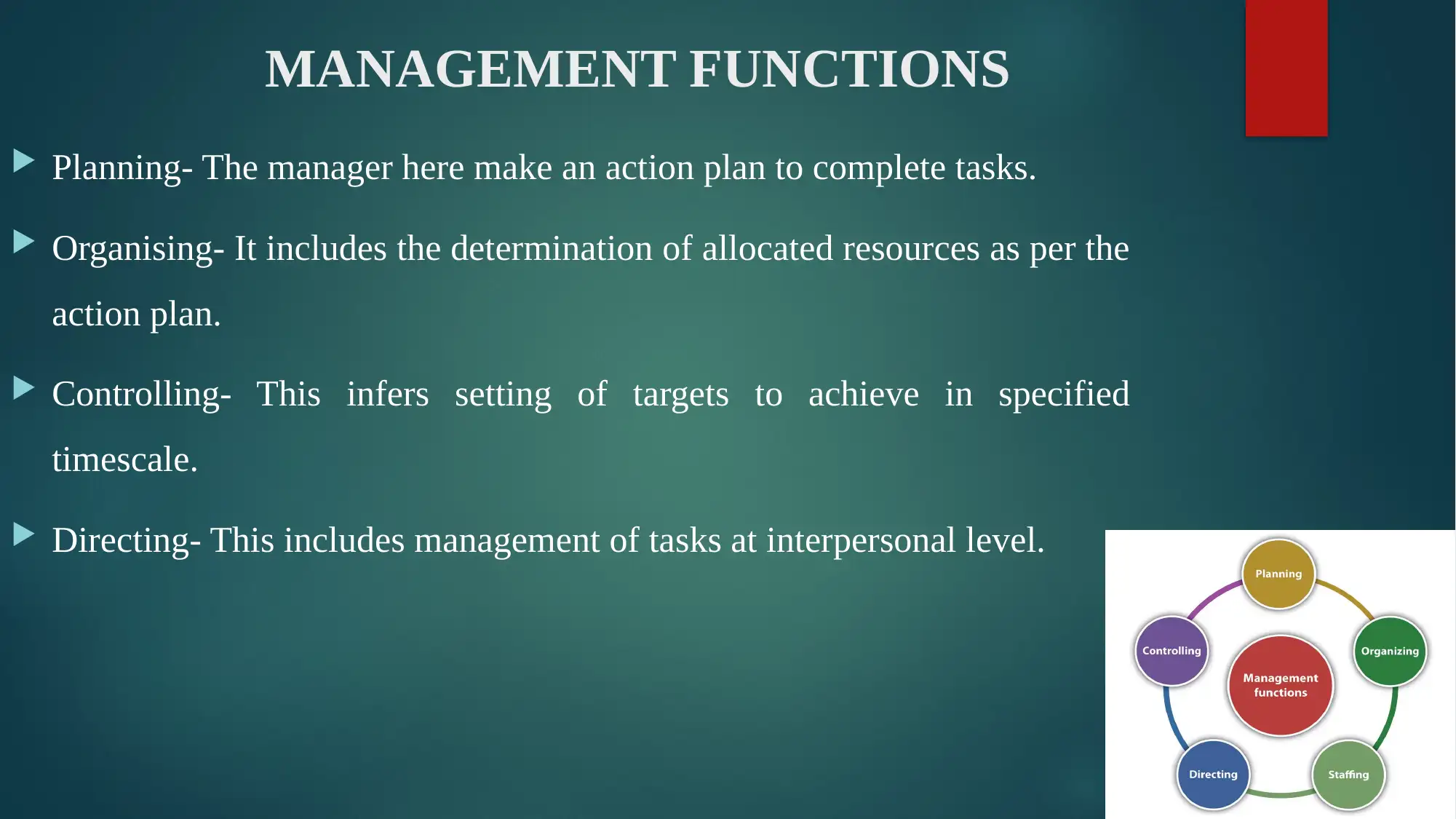
MANAGEMENT FUNCTIONS
Planning- The manager here make an action plan to complete tasks.
Organising- It includes the determination of allocated resources as per the
action plan.
Controlling- This infers setting of targets to achieve in specified
timescale.
Directing- This includes management of tasks at interpersonal level.
Planning- The manager here make an action plan to complete tasks.
Organising- It includes the determination of allocated resources as per the
action plan.
Controlling- This infers setting of targets to achieve in specified
timescale.
Directing- This includes management of tasks at interpersonal level.
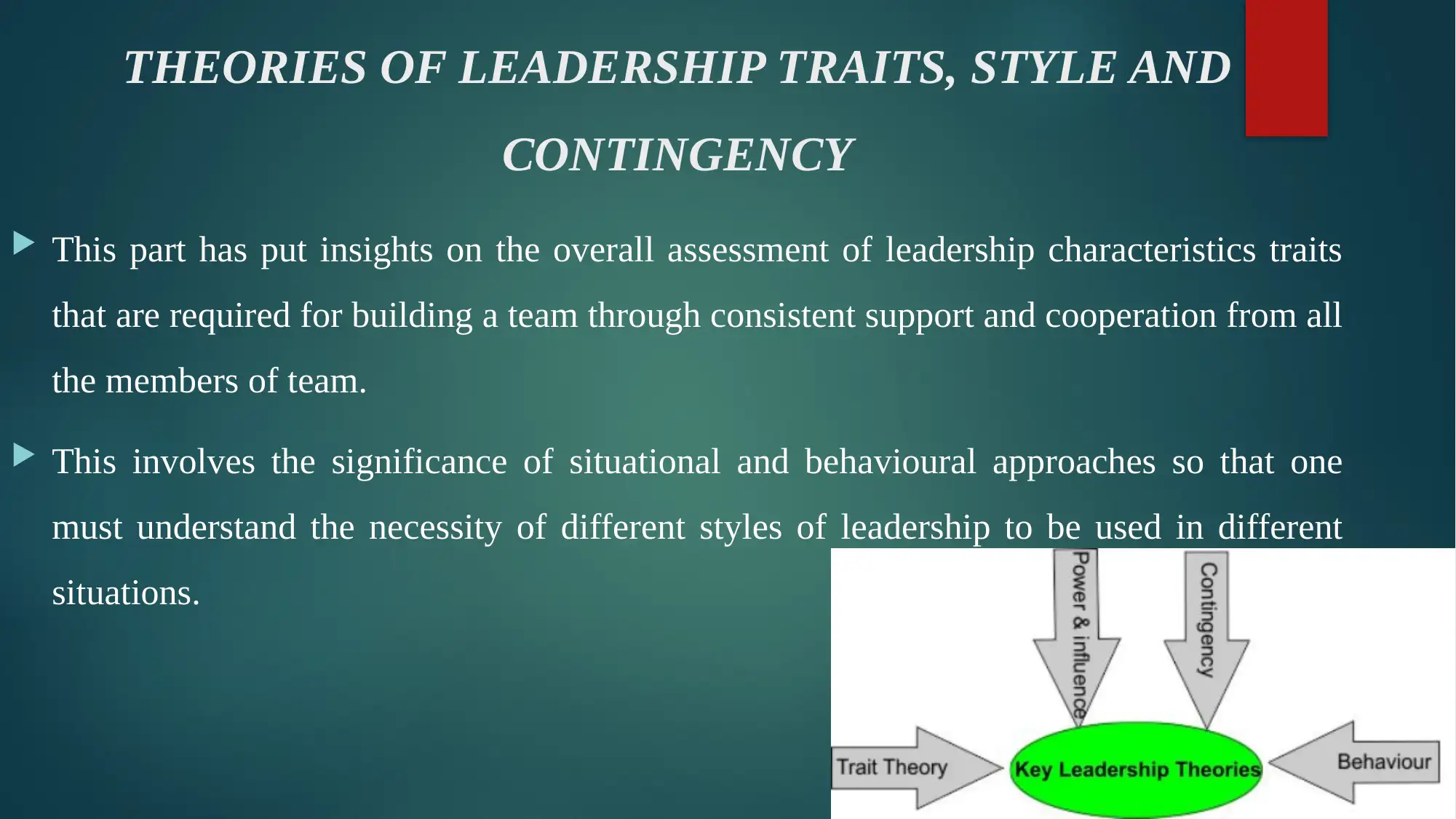
THEORIES OF LEADERSHIP TRAITS, STYLE AND
CONTINGENCY
This part has put insights on the overall assessment of leadership characteristics traits
that are required for building a team through consistent support and cooperation from all
the members of team.
This involves the significance of situational and behavioural approaches so that one
must understand the necessity of different styles of leadership to be used in different
situations.
CONTINGENCY
This part has put insights on the overall assessment of leadership characteristics traits
that are required for building a team through consistent support and cooperation from all
the members of team.
This involves the significance of situational and behavioural approaches so that one
must understand the necessity of different styles of leadership to be used in different
situations.
⊘ This is a preview!⊘
Do you want full access?
Subscribe today to unlock all pages.

Trusted by 1+ million students worldwide
1 out of 18
Related Documents
Your All-in-One AI-Powered Toolkit for Academic Success.
+13062052269
info@desklib.com
Available 24*7 on WhatsApp / Email
![[object Object]](/_next/static/media/star-bottom.7253800d.svg)
Unlock your academic potential
Copyright © 2020–2026 A2Z Services. All Rights Reserved. Developed and managed by ZUCOL.




